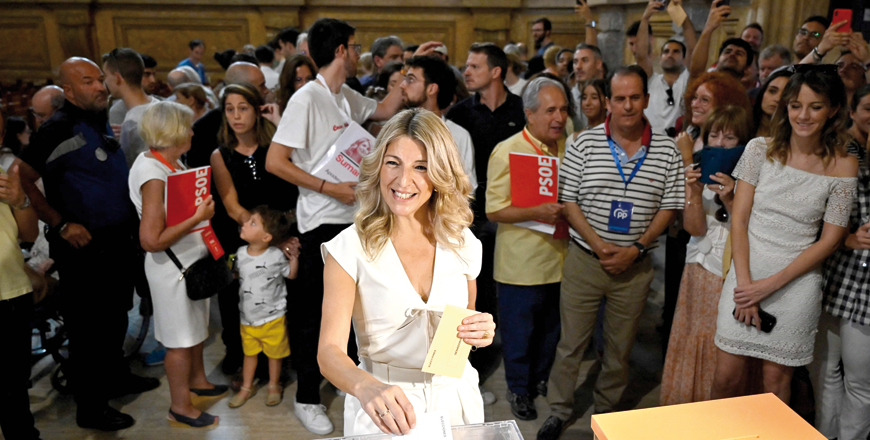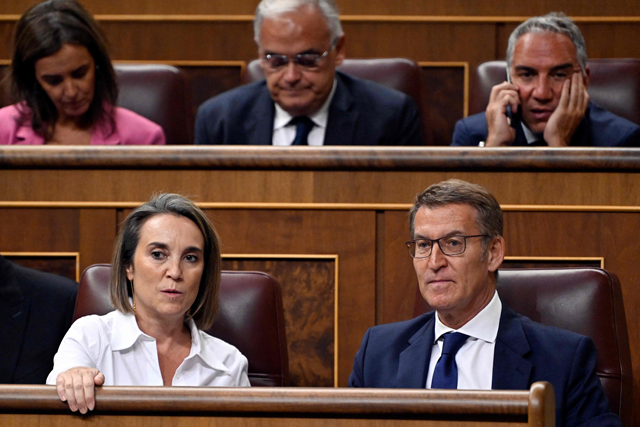You are here
Spain votes in snap election with right favoured to win
By AFP - Jul 23,2023 - Last updated at Jul 23,2023

Spain's Deputy Prime Minister, Minister of Labour and Social Economy and candidate of the radical-left alliance Sumar, Yolanda Diaz, casts her ballot during Spain's general election in Madrid on Sunday (AFP photos)
MADRID — Spain voted on Sunday in an early general election in which the conservative Popular Party (PP) was tipped to beat Prime Minister Pedro Sanchez's Socialists, but likely to need the far-right to govern.
PP leader Alberto Nunez Feijoo, a former civil servant, said he hoped "Spain can start a new era" after he cast his ballot in Madrid.
Final opinion polls allowed under Spanish law and published on Monday suggested the PP was on track to win the most seats in the 350-seat parliament, but fall short of a working parliamentary majority.
That could force the PP to form a coalition with Vox, giving a far-right party a share of power at the national level for the first time since the end of the decades-long dictatorship of General Francisco Franco in 1975.
Vox is part of a Europe-wide trend of far-right parties gaining support at the ballot box, with such formations already governing alone or in coalition with the centre-right in Hungary, Italy and Finland.
Sanchez, in office since 2018, warned during an ill-tempered TV debate with Feijoo that a PP-Vox coalition government would “take us into a dark time warp that will leave us who knows where”.
In its electoral programme, Vox pledges to overturn laws on gender violence, LGBTQ rights, abortion and euthanasia as well as outlaw separatist parties and defend traditions such as bullfighting.
Former British Prime Minister Gordon Brown called Vox’s agenda “chilling” in an opinion article published Sunday in French daily Le Monde, warning its entry into government in Spain “would push Europe one step further into a right-wing abyss”.
This is the first national election in Spain’s modern history to be held at the height of summer, when many people are on holidays.
Turnout as of 2:00pm (12:00 GMT) stood at 40.5 per cent, up from 37.9 per cent at the same tine during the last general election in 2019.
The figure does not include the record 2.47 million registered voters who cast an absentee ballot.
Many voters told Spanish media they voted early to avoid the scorching heat, while electric fans were installed in polling stations to try to keep people cool.
Maria Suner, an 80-year-old retiree, said the timing of the election was “ghastly”.
“It should be forbidden,” she told AFP at a Madrid polling station.
Sanchez, 51, called the snap polls after his Socialist party and its far-left junior coalition partners suffered a drubbing in May local and regional elections.
Under his watch the economy has outperformed most of its European Union peers, growing by 5.5 per cent last year, and inflation has dropped below the European Central Bank’s 2 per cent target this year, a rarity in Europe.
He has also introduced popular measures such as a sharp rise in the minimum wage, higher pensions and free commuter rail travel.
But his minority coalition government’s reliance on the votes of Catalan and Basque separatist parties to pass legislation has hurt his standing.
Many voters are especially angered by his occasional deals with Bildu, the heir of the political arm of the disbanded armed separatist group ETA which is blamed for over 850 deaths in its decades-long campaign of bombings and shootings for an independent Basque homeland.
Feijoo, 61, who sells himself as a safe pair of hands, has accused Sanchez of allowing “terrorists” to condition Spain’s future with his reliance on Bildu.
He has vowed to undo many of Sanchez’s laws, including one which allows anyone 16 and over to change their gender on their ID card on the basis of a simple statement.
Another major blow to Sanchez’s popularity was a botched law on sexual consent approved last year which led to roughly 100 convicted offenders being released from jail because of the way it redefines offences.
If the PP and Vox fall short of a working majority, that would give the Socialists a chance to form another government because they have more options to create alliances with smaller leftist and regional parties.
Related Articles
MADRID — Spaniards were voting on Sunday in local and regional polls seen as a barometer for a year-end general election which surveys sugge
MADRID — Alberto Nunez-Feijoo defended his bid to become Spain’s next prime minister in parliament on Tuesday, a day before an inauguration
MADRID — Lawmakers will on Tuesday begin debating Alberto Nunez-Feijoo’s bid to become Spain’s next prime minister a day before an inaugurat
















